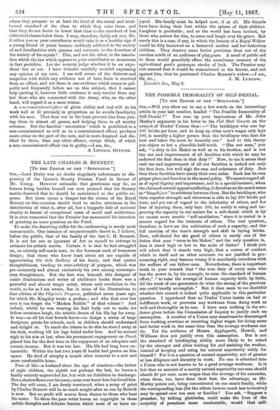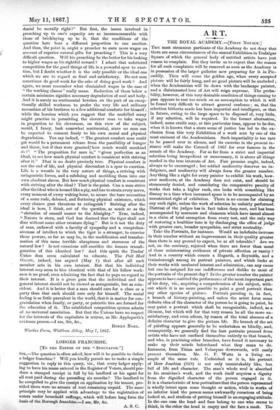THE POSSIBLE IMMORALITY OF SELF-DENIAL [To THE EDITOR OF THE
"SPECTATOR."] SIR,—Will you allow me to say a few words on the interesting article in your last number, headed "The Possible Immorality of Self-Denial ?" You sum up your impressions of Mr. John. Morley's argument in his letter to the Pall Mall Gazette on the subject of Trades' Unions thus :—" The bricklayer who can lay- 200 bricks per hour, and to keep up other men's wages only lays. 100, is morally a higher person than the bricklayer who does hig- hest and takes the most he honestly can." And to this theory you object as but a plausible half-truth. "Has not man," you ask, "a duty to his Maker as well as to his brother, and is not the use and improvement of all faculties with which he may be endowed the first item in that duty ?" Now, to me it seems that such use and improvement of all our faculties is indeed not only first item, but well nigh the sum and substance of duty. But then these faculties have surely their own order. Each has its own proper place and function in the moral polity. We cannot regard all as of equal dignity and importance, and in a special instance, when the claimsof several appearconfficting, it devolves on the moral sense- as "kingde jure " to arbitrate between them. But the bricklayer, who- from superior strength and cleverness is able to lay 200 bricks per hour, and yet out of regard to the inferiority of others, and for fear of injuring them, only lays 100, he surely is using and im- proving the capacity in our nature for a self-denial which is by no means mere ascetic "self-mutilation," since it is rooted in a sincere regard for the interests of others. The real question,. therefore, is between the cultivation of such a capacity, and the full exercise of the man's strength and skill in laying bricks. Now, self-denial for the good of others is surely one of the duties that man "owes to his Maker," and the only question is, does it stand high or low in the scale of duties? I think you will admit that it stands very high, that a course of conduct which in itself and on other accounts we are justified in pro- nouncing right, may become wrong if it manifestly interferes with the welfare of our fellow-man. Nevertheless, there is important- truth in your remark that "the true duty of every man who, has the power is, by his example, to raise the standard of human effort," "to raise the average of human capacity little by little, till the weak of one generation do what the strong of the previous one could hardly accomplish." But it does seem to me doubtful. whether this remark is indeed quite applicable to this particular question. I apprehend that no Trades' Union insists on bad or' indifferent work, or prevents any workman from doing work as well and thoroughly as he can. I have seen nothing in the evi- dence given before the 'Commission of Inquiry to justify such an assumption. A member of a Union may sometimes be discourage& from working overtime or receiving higher wages for doing more and better work in the same time than the average workman can do. Yet the evidence of Messrs. Applegarth, Howell, an& Williams does not justify even this assumption. But is not. the standard of bricklaying ability more likely to be raise& by the stronger and abler waiting for and assisting the weaker, instead of keeping and using his natural superiority solely for himself ? For it is a question of natural superiority, not of greater or less diligence and sincerity in work. No one is admitted into. a Union who is not known to be a good average workman. Is it- fair that on account of a merely natural superiority one man should absorb 20 per cent. more wages than the average of his comrades, when these, too, have done their best, the advantage, as Mr. Morley points out, being concentrated on one man's family, while the corresponding loss (for the others have so much less to receiveY may be spread over ten men or families ? You ask, "Suppose a preacher, by talking platitudes, could make the lives of the majority of preachers more comfortable, would that self-
denial be morally right?" But first, the issues involved in preaching up to one's capacity are so incommensurable with those of bricklaying up to it, that the conditions of the question here bear a different proportion to one another. And then, the point is, ought a preacher to earn more wages on account of superior natural gifts for preaching ? This is a very difficult question. Will his preaching be the better for his looking to higher wages as his rightful reward ? I admit that unfettered competition for the good things of life is a powerful spur to exer- tion, but I doubt whether it is the only possible or the ideal one which we are to regard as final and satisfactory. Do not men sometimes do good work for the sake of doing good work ? And
again, we must remember what diminished wages in the case of "the working classes" really mean. Reduction of them below a certain minimum signifies necessary degradation of soul and body. And it is surely no sentimental heroism on the part of an excep- tionally skilled workman to prefer the very life and ordinary necessities of his brethren to a few additional comforts for himself ; while the heroism which you suggest that the unskilled many might practise in permitting the cleverer man to take wages in proportion to his cleverness, on this view of the subject, would, I fancy, look somewhat sentimental, since no man can be expected to consent freely to his own _moral and physical degradation. You say indeed, "The greatest comfort man could get would be a permanent release from the possibility of hunger and thirst, but if that were granted,•how much would mankind do?" "The proposition for man is," "given perfection as an ideal, to see how much physical comfort is consistent with striving after it." That is no doubt precisely true. Physical comfort is not the end of life, and physical discomfort is a spur to exertion. Life is a wrestle in the very nature of things, a striving with antagonistic forces, and a subduing and moulding them into our own obedient slaves. But how much physical comfort is consistent with striving after the ideal ? Thetis the point. Can a man strive after the ideal who is housed like a pig, and has to strain every nerve, every moment of every waking hour, to secure the bare necessities of a mere rude, debased, and fluttering physical existence, which every chance gust threatens to extinguish ? Striving after the ideal is here, I think, out of the question, as much so as the "elevation of oneself nearer to the Almighty." True, indeed, "Nature is stern, and God has decreed that the tiger shall not dine without some other creature dying." But is it not the duty of man, endowed with a faculty of sympathy and a comprehen- siveness of intellect to which the tiger is a stranger, to exercise these powers, so far as may be, in the modification and transfor- mation of this same terrible abruptness and sternness of the natural law ? Is not conscious self-sacrifice the human transfi- guration of this identical law ? And this spirit the Trades' Union does seem calculated to educate. The Pall Mali Gazette, indeed, has argued (May 1) that after all each member acts in his own interest. But that his individual interest may seem to him identical with that of his fellow work- men is no proof, even admitting the fact that he pays no regard to their interest. It is a great gain that the individual and the general interest should not be viewed as antagonistic, but as coin- cident. And it is better that a man should care for a class or a party than that each should care only for himself. The social feeling is so little prevalent in the world, that it is matter for con- gratulation when family, or party, or patriotic ties are formed for the education of it. The established competition system admits of no universal association. But that the Unions have no respect for the interests of the capitalists is untrue, as Mr. Applegarth's evidence provea.—I am, Sir, &e.,































 Previous page
Previous page